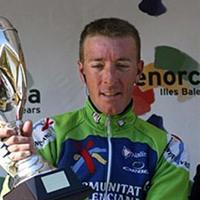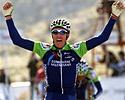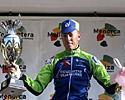
Recently on Cyclingnews.com |
An interview with David Bernabeu Armengol, March 11, 2006
Another Bernabeu in the spotlight
Following six years in Portugal, a place he calls his second home, David Bernabeu received the call to return to home to Spain in 2005. And with his Comunidad Valenciana team confirmed for the Tour de France, the 30 year-old from Valencia tells Cyclingnews' Hernan Alvarez he's poised to realise his dream of riding the Tour de France.

|
Bernabeu is a surname that reminds people all over the world of soccer. Santiago Bernabeu was a famous Real Madrid president in the twentieth century, and Madrid's stadium was named after this significant person in the history of that Spanish club. Now there's another Bernabeu in the spotlight: his first name is David and he rides for Comunidad Valenciana.
Victorious in the Trofeo Pollenca round and the overall winner of the Challenge Illes Balears, Bernabeu defeated some big names that included Paolo Bettini, Alejandro Valverde, Constantino Zaballa and Mario Aerts. This was not his first triumph, though, because in 2004, he won the Tour of Portugal and his second Trofeu Joaquim Agostinho. Cyclingnews caught up with him while he was resting in his native Spanish province of Valencia.
Cyclingnews: How do you feel after your victory in Majorca?
David Bernabeu: I feel good. The truth is that I'm happy. I had much expectation because I had prepared the very beginning of the season in order to start well. I think we are going the right way.
CN: Maybe the fact of beating two star riders like Paolo Bettini and Alejandro Valverde is not insignificant, right?
DB: Well, it also depends on the period of the year that you catch them. Maybe they didn't prepare the beginning of the season to be up front. I don't think it's meaningful right now, at this time of the year.
CN: But is your victory more valuable, considering these two names and others like Constantino Zaballa or other riders who are important in the international peloton?
"At the moment I feel in good shape, I can be at the front - whether it be a five, seven or twenty-day race."- David Bernabeu believes his characteristics are well suited to stage racing, and if all goes well, he hopes to test this theory at the 2006 Tour de France |
DB: Yes, it's true. If you notice the names, there were important people, but I think that [the most important thing] is that these are the people who are going well right now. Maybe Valverde is not in his best moment - I think that being in his best moment [Valverde], I don't think he would have missed a win in the Challenge of Majorca. He already demonstrated it last year [Valverde won the race in 2005].
CN: Which was the key stage in your opinion for your win there?
DB: I think the key stage was the uphill finale [in Pollença]. I won there in the uphill finish, then the next day I resisted on the way up the Coll De Puig Majo the day [the stage] finished in Soller. I consolidated the win there.
CN: After winning in Majorca, which are your targets throughout the year?
DB: We are going to ride the Vuelta a Valencia and the Vuelta a Murcia next week. Let's see if we have some luck and we take advantage of the good moment in which we are.
CN: Referring to the kind of race, maybe the one-week races or five-day races are the ideal ones considering your characteristics?

|
DB: I don't know, I think I am a rider for long tours. Yes, I can do well on those races and also on two week or three week races. I don't think I'm a sprinter or have a specialty; I think I'm a pretty complete rider so I think I'm able to go for overall wins. At the moment I feel in good shape, I can be at the front - whether it be a five, seven or twenty-day race.
CN: Changing the subject, your surname is very famous in Spain and also all over the world because of soccer. Has this fact brought you some anecdotes?
DB: The truth is that it hasn't brought me many anecdotes. Although being so well known, they often misspell my name. They used to misspell with similar surnames like Benavent or Bertome or something like that; being as easy as it is [for Spanish people], there are still people who misspell it.
CN: On your team's website you said your cycling dream was to ride the Tour de France. Could it be this year?
DB: I really hope that when March comes, we have the Tour's invitation [following this interview, Continental Pro teams Agritubel and Comunidad Valenciana were both awarded wildcards to this year's Tour de France - ed.]. I hope that apart from that, I am chosen to go to that race inside the team.
CN: You also answered positively when asked about Paris-Roubaix. Why do you like that race?
DB: Not only Paris-Roubaix but also the Classics in general. I think that the people who like cycling, find these races very attractive. They are very nice races and beautiful to see on TV. Unfortunately, I couldn't ever race any of them and I would really like to.
CN: Apart from Paris-Roubaix, what other races would you like do?
DB: Paris-Roubaix is very nice as is Tour of Flanders, but I think Paris-Roubaix is the greatest.
CN: How did you start with cycling? You had to go to Portugal in order to compete for a Portuguese team.
DB: That was when I became professional. I had to make the jump in Portugal because here in Spain I didn't have the opportunity that I think I earned... but it was complicated to change to pro that year here [in Spain], the only choice was to go to Portugal and if I wanted to keep on riding, I had to keep on that way. I accepted that and I was there in Portugal for six years and I feel no regret about it. It was a time that is over and that's it. If it wasn't because of Portuguese cycling, maybe I wouldn't be a professional right now.
CN: How did you manage with that?
DB: I did a lot of trips, many trips, going and coming back; also being there between races for maybe two weeks.
CN: In which part of Portugal did you stay?
DB: In Porto.
CN: Was that part of your life hard for you?

|
DB: It truly was at the beginning. The first year was very tough because you just get in the professional cycling and you are very young. Joining the professional world is different, and besides it was in a different country from yours where they speak another language, where there are other customs and you have to get used to that a bit. In the beginning it was hard, but then when years go by I felt very, very well there. It was like my second home.
CN: I guess that considering that Portugal is a Latin country with a similar language like yours it wasn't so hard as it could have been, such as in northern Europe that are even more different than Spain.
DB: Yes, I learnt fast. Besides, I like to learn. I am not a closed person; I like where I go, learn what they speak there, their customs, everything. At first, it cost me a bit but those were the first months. Then, I adapted myself to that and in the end, after a number of years, I felt at home there.
CN: I suppose that the Tour of Portugal also brings you good memories after your overall win in 2004.
DB: Yes, the Tour of Portugal is the greatest tour ridden there throughout the year. It's the same as the Vuelta a España here or the Tour de France is for the French. I have good memories because, as you say, I won it in 2004 and it's a tour that the riders give their all when they ride it. For them [Portuguese people] it is like the Tour de France for all the teams in the world. It's the most important race of the year.
CN: Being from Valencia, and now in the Comunidad Valenciana you should feel at home in this outfit?
DB: Yes, I truly wanted to be in a Spanish team and look, if it's a team from your own region, even better. In this case I had luck, in the end [team director Vicente] Belda trusted in me, took me away from Portugal and I am thankful to him. Let's see if I can reply to him with wins.
CN: When you stay in Valencia, you stay in the city of Valencia or in your town?
DB: In my town, Pobla Llarga.
CN: Where will you race after the Vuelta a Valencia and the Vuelta a Murcia?
DB: It depends on if they invite us to the Tour [de France] or they don't invite us. I think we will know it after Murcia, then we will plan the second part of the season.
